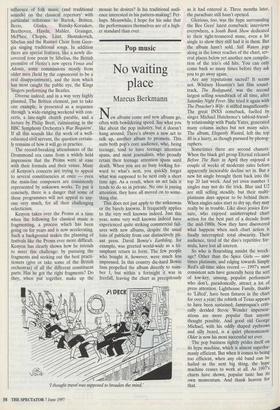Pop music
No waiting place
Marcus Berkmann
New albums come and new albums go, often with bewildering speed. Say what you like about the pop industry, but it doesn't hang around. There's always a new act to talk up, another album to promote. This suits both pop's core audience, who, being teenage, tend to have teenage attention spans, and most journalists, who proudly retain their teenage attention spans until death. When you are so busy looking for- ward to what's next, you quickly forget what was supposed to be next only a short time ago. As a result, when an act fails it tends to do so in private. No one is paying attention; they have all moved on to some- thing else.
This does not just apply to the unknowns or the barely knowns. It frequently applies to the very well knowns indeed. Just this year, some very well knowns indeed have experienced quite striking commercial fail- ures with new albums, despite the usual tons of publicity from our distinctively pli- ant press. David Bowie's Earthling, for example, was greeted world-wide as a tri- umphant return to form. The few people who bought it, however, were much less impressed. In this country die-hard Bowie fans propelled the album directly to num- ber 1, but within a fortnight it was in freefall, leaving the chart as precipitously 'I thought travel was supposed to broaden the mind.' as it had entered it. Three months later, the parachute still hasn't opened.
Glorious, too, was the hype surrounding the Bee Gees' latest comeback: interviews everywhere, a South Bank Show dedicated to their tight-trousered muse, even a hit single to show they still had it in them. But the album hasn't sold. Still Waters jogs along in the lower reaches of the chart, sev- eral places below yet another new compila- tion of the trio's old hits. You can only come back so many times before they ask you to go away again.
Are any reputations sacred? It seems not. Whitney Houston's last film sound- track, The Bodyguard, was the second largest selling soundtrack of all time, after Saturday Night Fever. She tried it again with The Preacher's Wife: it stiffed magnificently. The great INXS comeback, fuelled by singer Michael Hutchence's tabloid-friend- ly relationship with Paula Yates, generated many column inches but not many sales. The album, Elegantly Wasted, left the top 40 in a hurry, as though pursued by photog- raphers.
Sometimes there are second chances. When the black girl group Eternal released Before The Rain in April they enjoyed a couple of weeks of moderate sales before apparently inexorable decline set in. But a new hit single brought them back into the top 20 last week. And yet even number 1 singles may not do the trick. Blur and U2 are still selling steadily, but their multi- platinum days appear to be behind them. When singles sales start to dry up, they may really be in trouble. Like disco jessies Era- sure, who enjoyed uninterrupted chart action for the best part of a decade from the mid-1980s. Now they have discovered what happens when such chart action is finally interrupted: total obscurity. Their audience, tired of the duo's repetitive for- mula, have lost all interest.
So who is flourishing amidst the wreck- age? Other than the Spice Girls — nine times platinum, and edging towards Simply Red's all-time sales record — 1997's most consistent acts have generally been the sort of low-key, unsung, populist performers who don't, paradoxically, attract a lot of press attention. Lighthouse Family, thanks to 'Lifted', have been fixtures in the chart for over a year; the rebirth of Texas appears to have been sustained; Jamiroquai's criti- cally derided Stevie Wonder imperson- ations are more popular than anyone thought possible. And good old George Michael, with his oddly shaped eyebrows and silly beard, is a quiet phenomenon: Older is now his most successful set ever.
The pop business rightly prides itself on its hype machine, which is almost superhu- manly efficient. But when it comes to being too efficient, when any old band can be hailed as the next big thing, the hype machine ceases to work at all. As 1997 s charts have shown, popular taste has its own momentum. And thank heaven for that.










































































 Previous page
Previous page